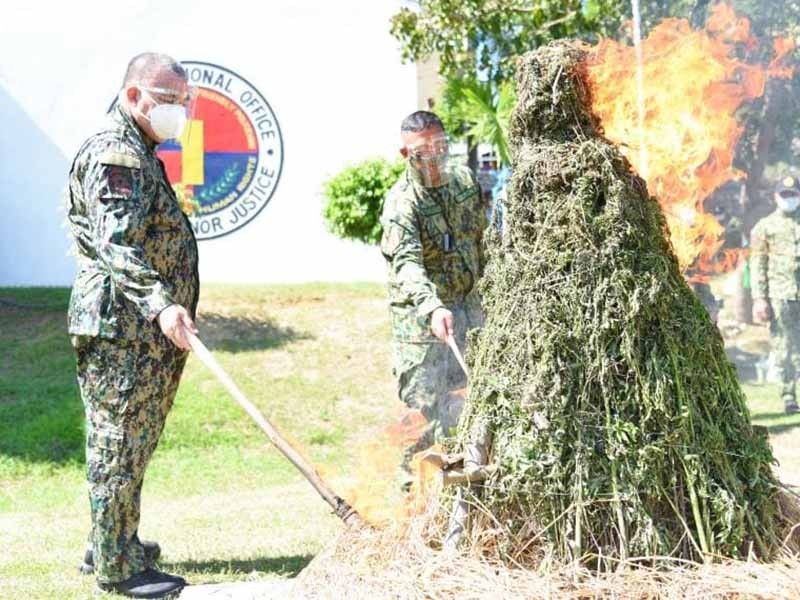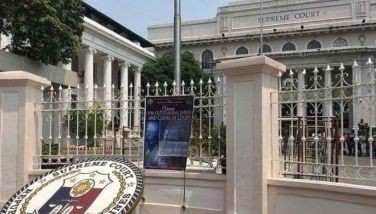Here's why and how the PNP burns marijuana that it confiscates

MANILA, Philippines — Under the Duterte administration, even cops have grown fond of blazing it. Literally, that is.
Since the onset of the chief executive's presidency, the practice of incinerating drugs to dispose of them has been a prominent practice among law enforcement personnel, particularly in operations involving marijuana.
According to the Philippine National Police's anti-drug arm, the procedure is for police officers to pile tons of marijuana, cover the drugs in oil and twine, and set them on fire after uprooting them.
"For marijuana, we go straight to on-site destruction upon uprooting the plants," Police Lt. Col. Cherrylou Donato, PNP Drug Enforcement Group spokesperson told Philstar.com in Filipino in a phone call, adding that these operating procedures were specific to marijuana.
"They can't carry that down the mountains because of the sheer amount...so they're just recorded for documentation."
The cultivation, possession, and use of cannabis plants, called "juts" or "damo" in the Philippines, is prohibited under the Comprehensive Dangerous Drugs Act of 2002.
After seizing operations, marijuana plants are often burned on-site by police personnel, while samples are "taken by the operatives for evidentiary purposes."
According to Donato, anti-drug operatives bring manila paper, gas, and even dry grass to uprooting operations. Destroying marijuana is the standard procedure across the PNP, she added.
Do they get high?
Asked if cops could get affected after inhaling burnt marijuana, she said: "Gamit sila double mask, pero kapag malakas ang hangin hindi maiwas na makalanghap din. Kaya pagdating sa kapatagan hugas at ligo agad mga operatives."
(They wear double masks, but if the fumes are strong, they can't avoid inhaling it. That's why when they get back to the plains, they wash and bathe right away.)
"Even if it isn't marijuana, naturally, you'll get a little dizzy when you burn something."
Burning marijuana and other confiscated illegal drugs is not unique to the Philippines, with the practice also being treated as a spectacle by Indonesian authorities. In a 2018 interview with VICE, the chief of the anti-drug unit in West Jakarta said burning it is part of accountability to the public and so it is clear that the drugs are not later stolen and sold again.
In 2015, law enforcement officials in an Indonesia town burned three tons of confiscated marijuana and, according to news reports, residents "reported suffering from headaches and dizziness after inhaling the tangy smoke given off by the bonfire. "
Court orders needed to destroy drug evidence
Under the law, court orders are required for the burning or destruction of any other drug evidence.
Speaking at Tuesday's hearing of the Senate Committee on Public Order and Dangerous Drugs, Sen. Ronald dela Rosa, himself a former PNP chief, expressed his frustration over the existing laws, saying they were what caused the emergence of cops involved in the illegal drug trade during his term as the country's top cop.
Section 21(4) of Republic Act No. 9165 or the Comprehensive Dangerous Drugs Act of 2002 reads:
After the filing of the criminal case, the Court shall, within seventy-two (72) hours, conduct an ocular inspection of the confiscated, seized and/or surrendered dangerous drugs, plant sources of dangerous drugs, and controlled precursors and essential chemicals, including the instruments/paraphernalia and/or laboratory equipment, and through the PDEA shall within twenty-four (24) hours thereafter proceed with the destruction or burning of the same
"That has been our frustration, when [illegal drugs] pile up for a long time. That's very tempting to recycle on the part of those with custody over those drugs. That's where the ninja cops came from," he said.
"If only we could just take the small sample evidence and then throw the rest into the canal so they're disposed of right away."
Last year, a Supreme Court Circular No. 118-2020, reminded all Regional Trial Courts to “strictly comply” with the requirements on the immediate destruction of illegal drugs confiscated during police operations.
What do the PNP's rules say?
Rule 37.3 of the PNP Revised Operational Procedures also lays out protocols after illegal drug operations, saying:
The apprehending officer/team having initial custody and control of the drugs shall, immediately after seizure and confi scation, physically inventory and photograph the same in the presence of the accused or the person/s from whom such items were confiscated and/or seized, or his/her representative or counsel, a representative from the media and the Department of Justice (DOJ), and any elected public official who shall be required to sign the copies of the inventory and be given a copythereof.
Within twenty-four (24) hours upon confiscation/seizure of dangerous drugs, plant sources of dangerous drugs, controlled precursors and essential chemicals, as well as instruments/paraphernalia and/or laboratory equipment, the same shall be submitted to the PNP Crime Laboratory for laboratory examination and proper disposition.
"Isang puno lang po ng marijuana ang bitbit for court presentation, pero kung may marijuana seeds na nakuha, lahat po iyon bitbit pabalik ng station," Donato said when asked for an amount that operatives take for sample.
(They just bring one marijuana tree back for court presentation, but if there are marijuna seeds recovered, they bring all of it back to the station.)
Data from an earlier Social Weather Stations survey released in January 2020 suggested that 78% of Filipinos believe that there are cops who sell illegal drugs confiscated during operations.
The survey asked 1,200 Filipinos across the country the question: "Do you believe or not believe the accusation that there are 'ninja cops' or police who allegedly sell illegal drugs that they confiscate during their operations?"
According to aggregated data from the Philippine National Police, Dangerous Drugs Board, and Philippine Drug Enforcement Agency, state forces have seized 5,477 kilograms of dried marijuana leaves and P48.7 billion worth of shabu since the onset of the Duterte administration.
- Latest
- Trending































